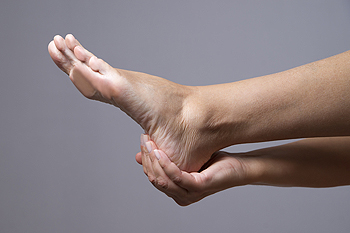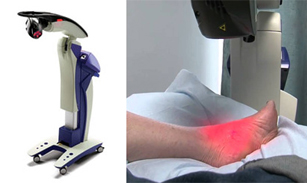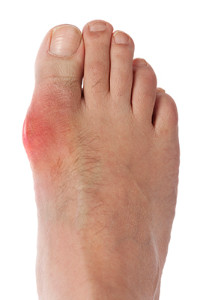Items filtered by date: January 2019
What Is a Plantar Wart?
 If you notice a small thickened area in the heel or bottom of your foot producing severe pain and discomfort, you may have what is referred to as a verruca wart, which is more commonly known as a plantar wart. It is caused by the human papillomavirus (HPV), and will typically attack the skin on the bottom of the feet. It typically lives and thrives in moist and warm environments which may include public pools and surrounding areas, shower room floors and locker rooms. It is known to enter the body through tiny cracks in the skin and grows into the heel as a result of pressure the foot endures while walking. Many people may notice a small and callused area where the wart has formed, and small black dots may be present in the center. If you have developed a plantar wart, please speak to a podiatrist who can properly treat this condition.
If you notice a small thickened area in the heel or bottom of your foot producing severe pain and discomfort, you may have what is referred to as a verruca wart, which is more commonly known as a plantar wart. It is caused by the human papillomavirus (HPV), and will typically attack the skin on the bottom of the feet. It typically lives and thrives in moist and warm environments which may include public pools and surrounding areas, shower room floors and locker rooms. It is known to enter the body through tiny cracks in the skin and grows into the heel as a result of pressure the foot endures while walking. Many people may notice a small and callused area where the wart has formed, and small black dots may be present in the center. If you have developed a plantar wart, please speak to a podiatrist who can properly treat this condition.
Plantar warts can be very uncomfortable. If you need your feet checked, contact one of our podiatrists from Summit Podiatry. Our doctors will assist you with all of your foot and ankle needs.
About Plantar Warts
Plantar warts are the result of HPV, or human papillomavirus, getting into open wounds on the feet. They are mostly found on the heels or balls of the feet.
While plantar warts are generally harmless, those experiencing excessive pain or those suffering from diabetes or a compromised immune system require immediate medical care. Plantar warts are easily diagnosed, usually through scraping off a bit of rough skin or by getting a biopsy.
Symptoms
- Lesions on the bottom of your feet, usually rough and grainy
- Hard or thick callused spots
- Wart seeds, which are small clotted blood vessels that look like little black spots
- Pain, discomfort, or tenderness of your feet when walking or standing
Treatment
- Freezing
- Electric tool removal
- Laser Treatment
- Topical Creams (prescription only)
- Over-the-counter medications
To help prevent developing plantar warts, avoid walking barefoot over abrasive surfaces that can cause cuts or wounds for HPV to get into. Avoiding direct contact with other warts, as well as not picking or rubbing existing warts, can help prevent the further spread of plantar warts. However, if you think you have developed plantar warts, speak to your podiatrist. He or she can diagnose the warts on your feet and recommend the appropriate treatment options.
If you have any questions please feel free to contact one of our offices located in Wilmington, Whiteville, and Wallace, NC . We offer the newest diagnostic and treatment technologies for all your foot and ankle needs.
What Is a Plantar Wart?
 If you notice a small thickened area in the heel or bottom of your foot producing severe pain and discomfort, you may have what is referred to as a verruca wart, which is more commonly known as a plantar wart. It is caused by the human papillomavirus (HPV), and will typically attack the skin on the bottom of the feet. It typically lives and thrives in moist and warm environments which may include public pools and surrounding areas, shower room floors and locker rooms. It is known to enter the body through tiny cracks in the skin and grows into the heel as a result of pressure the foot endures while walking. Many people may notice a small and callused area where the wart has formed, and small black dots may be present in the center. If you have developed a plantar wart, please speak to a podiatrist who can properly treat this condition.
If you notice a small thickened area in the heel or bottom of your foot producing severe pain and discomfort, you may have what is referred to as a verruca wart, which is more commonly known as a plantar wart. It is caused by the human papillomavirus (HPV), and will typically attack the skin on the bottom of the feet. It typically lives and thrives in moist and warm environments which may include public pools and surrounding areas, shower room floors and locker rooms. It is known to enter the body through tiny cracks in the skin and grows into the heel as a result of pressure the foot endures while walking. Many people may notice a small and callused area where the wart has formed, and small black dots may be present in the center. If you have developed a plantar wart, please speak to a podiatrist who can properly treat this condition.
Plantar warts can be very uncomfortable. If you need your feet checked, contact Dr. Derek T. Pantiel from Summit Podiatry. Our doctor will assist you with all of your foot and ankle needs.
About Plantar Warts
Plantar warts are the result of HPV, or human papillomavirus, getting into open wounds on the feet. They are mostly found on the heels or balls of the feet.
While plantar warts are generally harmless, those experiencing excessive pain or those suffering from diabetes or a compromised immune system require immediate medical care. Plantar warts are easily diagnosed, usually through scraping off a bit of rough skin or by getting a biopsy.
Symptoms
- Lesions on the bottom of your feet, usually rough and grainy
- Hard or thick callused spots
- Wart seeds, which are small clotted blood vessels that look like little black spots
- Pain, discomfort, or tenderness of your feet when walking or standing
Treatment
- Freezing
- Electric tool removal
- Laser Treatment
- Topical Creams (prescription only)
- Over-the-counter medications
To help prevent developing plantar warts, avoid walking barefoot over abrasive surfaces that can cause cuts or wounds for HPV to get into. Avoiding direct contact with other warts, as well as not picking or rubbing existing warts, can help prevent the further spread of plantar warts. However, if you think you have developed plantar warts, speak to your podiatrist. He or she can diagnose the warts on your feet and recommend the appropriate treatment options.
If you have any questions please feel free to contact one of our offices located in Wilmington, Whiteville, and Burgaw, NC . We offer the newest diagnostic and treatment technologies for all your foot and ankle needs.
Read more about All About Plantar WartsShockwave Therapy and Plantar Fasciitis
 Patients who endure chronic foot pain as a result of plantar fasciitis or tendonitis may be interested in engaging in shockwave therapy as a possible treatment option. This type of treatment is known to be effective in bringing upon a healing response which can precede the repair process. There are generally two types of this type of therapy, and these are referred to as low and high energy treatments. The treatment is performed in three or more sessions, and typically causes little or no pain. The latter may require anesthesia which may be effective in blocking any pain that may come from this one-time treatment method. There are known to be benefits in addition to disadvantages if this type of treatment is chosen, and it is strongly suggested to consult with a podiatrist who can determine if this is correct for you
Patients who endure chronic foot pain as a result of plantar fasciitis or tendonitis may be interested in engaging in shockwave therapy as a possible treatment option. This type of treatment is known to be effective in bringing upon a healing response which can precede the repair process. There are generally two types of this type of therapy, and these are referred to as low and high energy treatments. The treatment is performed in three or more sessions, and typically causes little or no pain. The latter may require anesthesia which may be effective in blocking any pain that may come from this one-time treatment method. There are known to be benefits in addition to disadvantages if this type of treatment is chosen, and it is strongly suggested to consult with a podiatrist who can determine if this is correct for you
Shockwave therapy is a treatment commonly used to treat various injuries and conditions, particularly plantar fasciitis in the feet. To learn more, consult with one of our podiatrists from Summit Podiatry. Our doctors can provide the care you need to keep you pain-free and on your feet.
Shockwave Therapy
Shockwave therapy is a new treatment option designed to treat bone conditions such as tennis elbow, shoulder pain, and others. Shockwave therapy uses high intensity sound waves that are directed to the affected tissues of the body with pinpoint accuracy. The effects are very beneficial, leading to a production of collagen fibers, eliminating inflammation.
Who Benefits from Shockwave?
Shockwave is recommended for patients suffering from heel pain and associated problems. Heel pain is a common condition which can be caused by obesity, overexertion, and spending a substantial amount of time on hard floors with your feet exposed and unsupported.
Fast and Easy
The therapy is actually a simple process that can leave patients feeling better the very next day. Shockwave therapy is not as dramatic as it sounds. It enables more blood flow to effected areas, addressing the source of the problem and allowing treatment to last for a long time.
Treatment & Recovery Time
Shockwave treatment will enable your feet to recover quickly. This is especially important since surgery is not required. It is cost effective and does not require the use of anesthesia. This treatment is a better option to surgery, since it is proven safe.
If you have any questions, please feel free to contact one of our offices located in Wilmington, Whiteville, and Wallace, NC . We offer the newest diagnostic and treatment technologies for all your foot and ankle needs.
Shockwave Therapy and Plantar Fasciitis
 Patients who endure chronic foot pain as a result of plantar fasciitis or tendonitis may be interested in engaging in shockwave therapy as a possible treatment option. This type of treatment is known to be effective in bringing upon a healing response which can precede the repair process. There are generally two types of this type of therapy, and these are referred to as low and high energy treatments. The treatment is performed in three or more sessions, and typically causes little or no pain. The latter may require anesthesia which may be effective in blocking any pain that may come from this one-time treatment method. There are known to be benefits in addition to disadvantages if this type of treatment is chosen, and it is strongly suggested to consult with a podiatrist who can determine if this is correct for you
Patients who endure chronic foot pain as a result of plantar fasciitis or tendonitis may be interested in engaging in shockwave therapy as a possible treatment option. This type of treatment is known to be effective in bringing upon a healing response which can precede the repair process. There are generally two types of this type of therapy, and these are referred to as low and high energy treatments. The treatment is performed in three or more sessions, and typically causes little or no pain. The latter may require anesthesia which may be effective in blocking any pain that may come from this one-time treatment method. There are known to be benefits in addition to disadvantages if this type of treatment is chosen, and it is strongly suggested to consult with a podiatrist who can determine if this is correct for you
Shockwave therapy is a treatment commonly used to treat various injuries and conditions, particularly plantar fasciitis in the feet. To learn more, consult with Dr. Derek T. Pantiel from Summit Podiatry. Our doctor can provide the care you need to keep you pain-free and on your feet.
Shockwave Therapy
Shockwave therapy is a new treatment option designed to treat bone conditions such as tennis elbow, shoulder pain, and others. Shockwave therapy uses high intensity sound waves that are directed to the affected tissues of the body with pinpoint accuracy. The effects are very beneficial, leading to a production of collagen fibers, eliminating inflammation.
Who Benefits from Shockwave?
Shockwave is recommended for patients suffering from heel pain and associated problems. Heel pain is a common condition which can be caused by obesity, overexertion, and spending a substantial amount of time on hard floors with your feet exposed and unsupported.
Fast and Easy
The therapy is actually a simple process that can leave patients feeling better the very next day. Shockwave therapy is not as dramatic as it sounds. It enables more blood flow to effected areas, addressing the source of the problem and allowing treatment to last for a long time.
Treatment & Recovery Time
Shockwave treatment will enable your feet to recover quickly. This is especially important since surgery is not required. It is cost effective and does not require the use of anesthesia. This treatment is a better option to surgery, since it is proven safe.
If you have any questions, please feel free to contact one of our offices located in Wilmington, Whiteville, and Burgaw, NC . We offer the newest diagnostic and treatment technologies for all your foot and ankle needs.
Read more about Shockwave TherapyIntense Pain May Be Associated with Gout
 Gout is known to be a painful and uncomfortable condition that typically affects the big toe. This part of the foot may be so sensitive that the weight of a bed sheet may cause intense pain. There are additional symptoms that may be associated with gout, including redness, swelling and extreme heat that may radiate from it. This ailment is said to be caused by excess uric acid in the blood levels that originate from ingesting foods that are laden with purines. Many patients notice these severe symptoms in the big toe, although it may occur in other parts of the body. Specific medications may be prescribed once an attack of gout has occurred, and there may be preventative measures that can be implemented which can possibly avoid this painful condition from occurring. If you feel you may have gout, it is advised to speak with a podiatrist as quickly as possible to learn more about this condition, in addition to beginning the correct treatment.
Gout is known to be a painful and uncomfortable condition that typically affects the big toe. This part of the foot may be so sensitive that the weight of a bed sheet may cause intense pain. There are additional symptoms that may be associated with gout, including redness, swelling and extreme heat that may radiate from it. This ailment is said to be caused by excess uric acid in the blood levels that originate from ingesting foods that are laden with purines. Many patients notice these severe symptoms in the big toe, although it may occur in other parts of the body. Specific medications may be prescribed once an attack of gout has occurred, and there may be preventative measures that can be implemented which can possibly avoid this painful condition from occurring. If you feel you may have gout, it is advised to speak with a podiatrist as quickly as possible to learn more about this condition, in addition to beginning the correct treatment.
Gout is a foot condition that requires certain treatment and care. If you are seeking treatment, contact one of our podiatrists from Summit Podiatry. Our doctors will treat your foot and ankle needs.
What Is Gout?
Gout is a type of arthritis caused by a buildup of uric acid in the bloodstream. It often develops in the foot, especially the big toe area, although it can manifest in other parts of the body as well. Gout can make walking and standing very painful and is especially common in diabetics and the obese.
People typically get gout because of a poor diet. Genetic predisposition is also a factor. The children of parents who have had gout frequently have a chance of developing it themselves.
Gout can easily be identified by redness and inflammation of the big toe and the surrounding areas of the foot. Other symptoms include extreme fatigue, joint pain, and running high fevers. Sometimes corticosteroid drugs can be prescribed to treat gout, but the best way to combat this disease is to get more exercise and eat a better diet.
If you have any questions please feel free to contact one of our offices located in Wilmington, Whiteville, and Wallace, NC . We offer the newest diagnostic and treatment technologies for all your foot and ankle needs.
Wounds That Don't Heal Need to Be Checked
Intense Pain May Be Associated with Gout
 Gout is known to be a painful and uncomfortable condition that typically affects the big toe. This part of the foot may be so sensitive that the weight of a bed sheet may cause intense pain. There are additional symptoms that may be associated with gout, including redness, swelling and extreme heat that may radiate from it. This ailment is said to be caused by excess uric acid in the blood levels that originate from ingesting foods that are laden with purines. Many patients notice these severe symptoms in the big toe, although it may occur in other parts of the body. Specific medications may be prescribed once an attack of gout has occurred, and there may be preventative measures that can be implemented which can possibly avoid this painful condition from occurring. If you feel you may have gout, it is advised to speak with a podiatrist as quickly as possible to learn more about this condition, in addition to beginning the correct treatment.
Gout is known to be a painful and uncomfortable condition that typically affects the big toe. This part of the foot may be so sensitive that the weight of a bed sheet may cause intense pain. There are additional symptoms that may be associated with gout, including redness, swelling and extreme heat that may radiate from it. This ailment is said to be caused by excess uric acid in the blood levels that originate from ingesting foods that are laden with purines. Many patients notice these severe symptoms in the big toe, although it may occur in other parts of the body. Specific medications may be prescribed once an attack of gout has occurred, and there may be preventative measures that can be implemented which can possibly avoid this painful condition from occurring. If you feel you may have gout, it is advised to speak with a podiatrist as quickly as possible to learn more about this condition, in addition to beginning the correct treatment.
Gout is a foot condition that requires certain treatment and care. If you are seeking treatment, contact Dr. Derek T. Pantiel from Summit Podiatry. Our doctor will treat your foot and ankle needs.
What Is Gout?
Gout is a type of arthritis caused by a buildup of uric acid in the bloodstream. It often develops in the foot, especially the big toe area, although it can manifest in other parts of the body as well. Gout can make walking and standing very painful and is especially common in diabetics and the obese.
People typically get gout because of a poor diet. Genetic predisposition is also a factor. The children of parents who have had gout frequently have a chance of developing it themselves.
Gout can easily be identified by redness and inflammation of the big toe and the surrounding areas of the foot. Other symptoms include extreme fatigue, joint pain, and running high fevers. Sometimes corticosteroid drugs can be prescribed to treat gout, but the best way to combat this disease is to get more exercise and eat a better diet.
If you have any questions please feel free to contact one of our offices located in Wilmington, Whiteville, and Burgaw, NC . We offer the newest diagnostic and treatment technologies for all your foot and ankle needs.
Read more about Everything You Need to Know About Gout

